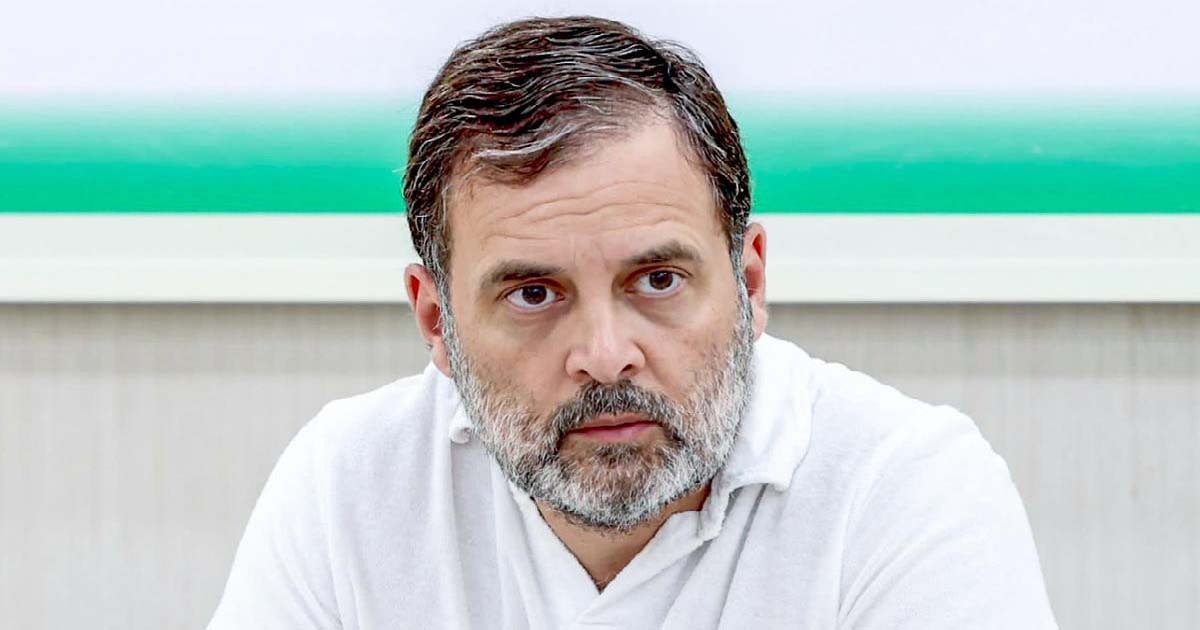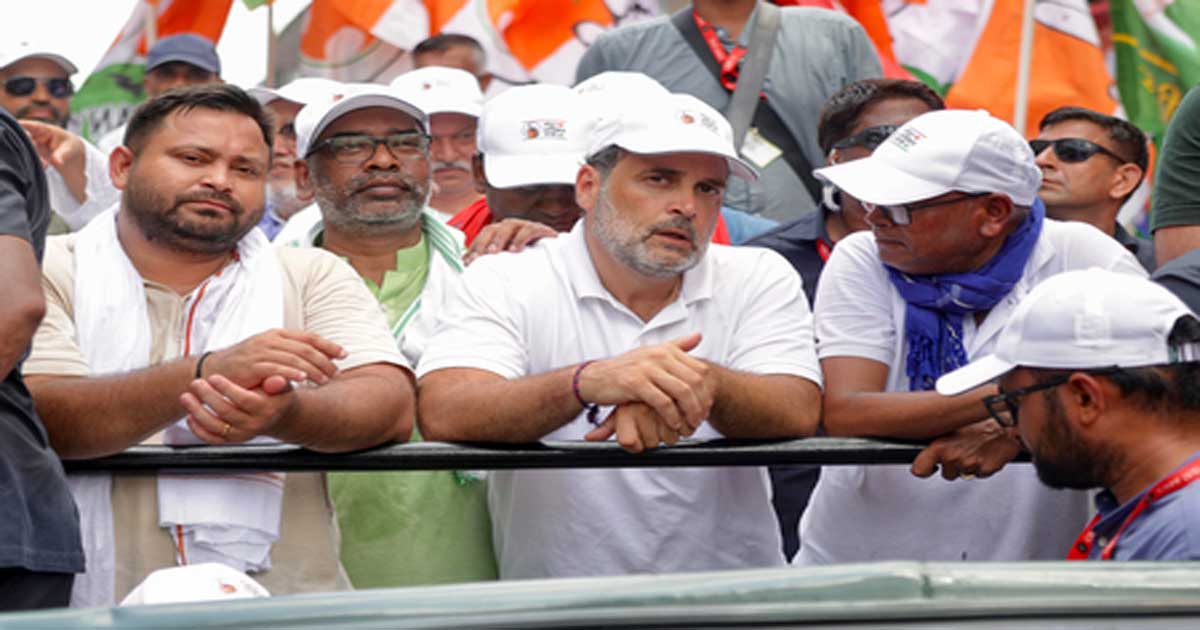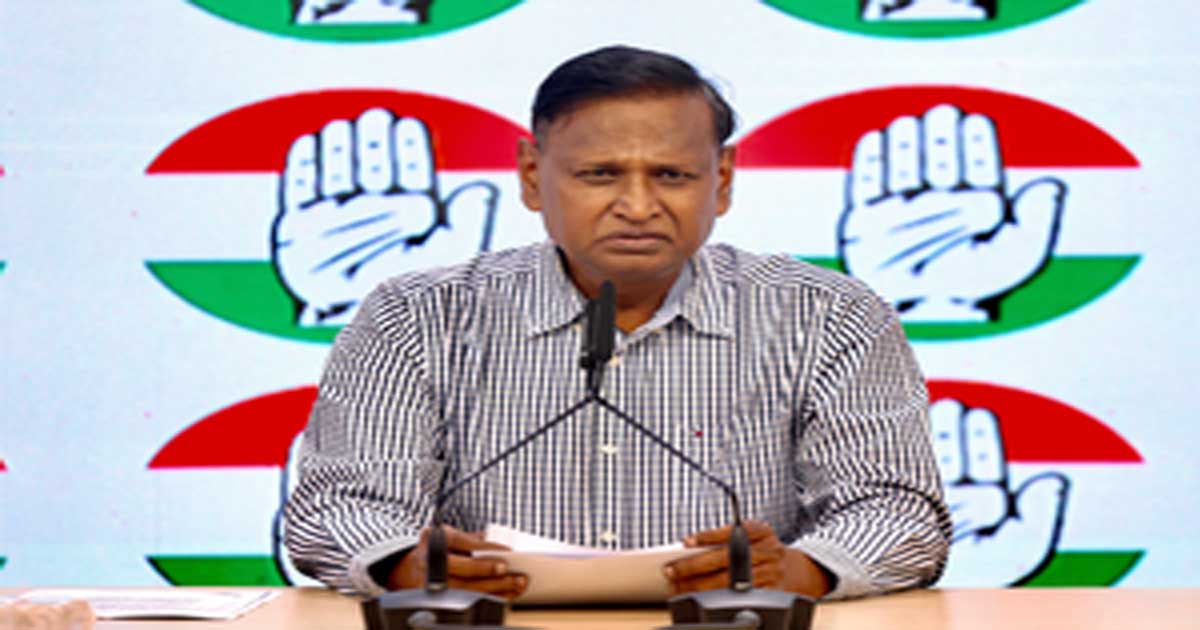National News
Never enquired about how many Pak jets shot down: BJP takes ‘Nishan-e-Pakistan’ swipe at Rahul Gandhi

New Delhi, May 20: Amid the growing verbal exchange between the Congress and BJP over India’s ‘alerting’ Pakistan ahead of Operation Sindoor, the latter stepped up the offensive and took a caustic jibe at the Leader of Opposition (LoP), Rahul Gandhi, on Tuesday.
BJP IT cell chief Amit Malviya took to X to share a picture of Congress MP and Pak Army chief Asim Munir overlapping with each other.
“What’s next for Rahul Gandhi? The Nishan-e-Pakistan?” he wrote, taking a sharp swipe.
Rahul Gandhi, along with other Congress leaders, has been targeting the Centre over External Affairs Minister S. Jaishankar’s statement that India gave a warning to Pakistan before launching a military operation. Congress claims that it was not just a strategic lapse but an ‘unpardonable’ crime. However, the charges have been outrightly refuted by the Ministry.
Amit Malviya, sharing the juxtaposed picture of Rahul and Pak Army chief on X, accused the Congress leader of speaking on behalf of Pakistan.
“It is not surprising that Rahul Gandhi is speaking the language of Pakistan and its benefactors. He hasn’t congratulated the Prime Minister on the flawless Operation Sindoor, which unmistakably showcases India’s dominance.”
He also claimed that the Congress MP hasn’t once inquired about how many Pakistani jets were shot down during the conflict, or how many were destroyed while parked in their hangars when Indian forces pounded Pakistani airbases.
“Instead, he repeatedly asks how many jets we lost – a question that has already been addressed in the DGMO briefings,” Malviya claimed.
The controversial image of Rahul and Asim Munir, put together in one frame, is set to create a political furore, with Congress taking a strong objection to it.
Early this morning, Assam cabinet minister Ashok Singhal also shared the same image and captioned it – ‘divided by borders, united by agenda’, reiterating the party’s charge that Congress’ talk of national security merely remains on paper and when it comes to action, they start taking sides of India’s adversary.
In another post, Malviya wrote that Rahul Gandhi was the new age Mir Jafar and also shared a cartoon.
Mumbai Press Exclusive News
TTP, ISKP, LeJ and others eye escalated attacks amid Pakistan army’s vulnerability

New Delhi, Oct 21: The Pakistan army has been caught in several embarrassing situations in recent times. While Operation Sindoor exposed the fault lines within the Pakistan army, it has suffered huge casualties at the hands of terrorist groups, all of which it created.
Pakistan may have entered into a delicate truce with the Taliban, but many question how long it will last. The rate at which the Tehreek-e-Taliban Pakistan (TTP) has created losses for the army has now emboldened other terror groups to take on the establishment.
Pakistan watchers and security experts say that there are many outfits which want the establishment thrown out. The TTP, Lashkar-e-Jhangvi (LeJ) and the Islamic State Khorasan Province (ISKP) want the rule of Islam established in Pakistan and the establishment to be overthrown.
The LeJ has focused largely on sectarian violence and has targeted the religious minority. It is not in the good books of the establishment, and in the near future, it could expand the scope of its attacks.
It has in the past carried out attacks against the Pakistan establishment, and the worry for Islamabad now is that the LeJ could go back to aligning either with the ISKP or TTP. The LeJ has, in the past, aligned with both these groups separately and hence a repeat of this cannot be ruled out. The ISKP, which was roped in Pakistan to fight against the TTP and Afghan Taliban, may not take a backseat due to the prevailing truce.
The ISKP had primarily joined hands with the Pakistan establishment to battle against the Afghan Taliban. However, if both sides have made peace, then the ISKP may back out. It is more likely that the ISKP may join hands with the LeJ rather than the TTP. The TTP is perceived to have the support of the Afghan Taliban.
Moreover, the ISKP was formed by former members of the TTP, and hence, the two coming together is difficult. Whether or not these groups come together or not, they are well aware of the weakness within the Pakistan army.
Intelligence Bureau officials say that, as per their assessment, even if these groups fight individually, they are in the days to come scale up attacks against the establishment. Pakistan is not even in a position to seek the support of the Lashkar-e-Tayiba or Jaish-e-Mohammad to battle against these groups. The Jaish-e-Mohammad has had a blow-hot, blow-cold relationship with the establishment. Further, if it is asked to fight against the TTP, the outfit may witness a split.
The Jaish-e-Mohammad is sympathetic towards both the Afghan Taliban and TTP and hence may not join the establishment. The case of the Lashkar-e-Tayiba is similar. While this outfit has never rebelled against the establishment, there was a chance of a major split when Pakistan was helping the US in the war in Afghanistan. Many cadres were unhappy with this stance and had even threatened to walk away and join the Taliban in Afghanistan.
While the threat of these groups spiralling out of control looms large, the Pakistan army has other problems, and that is in Balochistan.
The Baloch groups are driven by ethnic nationalism and secular separatism. They are seeking an independent proving. The Baloch groups in recent years have caused immense embarrassment to the Pakistan army. They have primarily targeted Chinese nationals and investments apart from the army. These groups too have realised that the army is weak and with Pakistan battling on many fronts, it would gear up for a bigger fight in Balochistan also.
National News
‘Political deceit’, JMM blames INDIA bloc allies for no seat-sharing pact in Bihar

Ranchi, Oct 21: The Jharkhand Mukti Morcha (JMM) on Tuesday launched a sharp attack on its INDIA bloc allies, accusing them of keeping the party “bewildered” over seat-sharing arrangements for the upcoming Bihar Assembly elections and forcing it to withdraw from the contest.
As the Bihar polls draw closer, internal tensions have surfaced within the Mahagathbandhan, with the JMM announcing its exit from the alliance just a day after declaring plans to contest six seats independently.
The decision, made public by Jharkhand Minister and senior JMM leader Sudivya Kumar in Giridih, came amid what he termed “political cunning” by the Congress and the Rashtriya Janata Dal (RJD). Kumar alleged that the senior partners had undermined the JMM’s position and betrayed the principles of coalition politics.
Speaking to media, JMM spokesperson Manoj Kumar Pandey said, “Somewhere, a situation of confusion has been created that has left us bewildered. We did not want to be excluded from the alliance and made every possible effort, but unfortunately, we failed in our attempts. It is sad and unfortunate that political deceit or broken trust was exercised against us, which could have adverse effects on the INDIA bloc.”
“Will the alliance work like this only? We always supported our allies. We have always given them more. We even made their party leaders ministers. They were able to see the Assembly because of us. I am openly saying this. Even after this, if something like this happens with us, then it is wrong,” he added.
Reacting to the development, Congress leader Rakesh Sinha said the JMM deserved to get seats for the upcoming polls, but Congress should not be blamed for it.
Speaking to media, Sinha said, “I believe the Jharkhand Mukti Morcha is a natural ally, and naturally, it should get seats in Bihar. However, what circumstances arose and what situations developed can only be explained by the leadership, whether from the Rashtriya Janata Dal or the Jharkhand Mukti Morcha. Discussions did take place, and two representatives from here also went to the talks. What happened there in Bihar, I am not aware, but JMM should have got the seats in Bihar.”
Sinha, however, clarified that the Congress should not be blamed for the fallout.
“The Congress has always made sacrifices for the sake of the alliance. We want the alliance to be formed with full strength because this is a fight to protect democracy and the Constitution. The Congress Party has consistently shown its commitment and sacrifice within the alliance,” he said.
National News
‘Those who light diyas responsible for Hindu-Muslim divide’: Udit Raj on Deepotsav record

New Delhi, Oct 21: Congress leader Udit Raj on Tuesday criticised the Ayodhya Deepotsav celebrations, claiming that those who light diyas are the same people who create a Hindu-Muslim divide and are responsible for the oppression of Dalits.
The sacred city of Ayodhya marked this Diwali with a record-breaking Deepotsav celebration that lit up the ghats of the Saryu River and reignited political tempers across the spectrum.
The city entered the Guinness World Records after 26.17 lakh earthen lamps illuminated the riverbanks, while 2,128 devotees performed a synchronised aarti, creating a grand spectacle of spiritual fervour and visual splendour.
A Guinness World Records certificate was formally conferred, underscoring Ayodhya’s growing prominence on the global spiritual map.
Reacting to the event, Udit Raj told IANS, “Those who light diyas are responsible for the Hindu-Muslim divide in the society. They are responsible for Dalit oppression. They only talk about hatred. No matter how many diyas they light, it does not matter. There are several other records in India, like crime against Dalits, poverty, and unemployment. These should also be focused on.”
He also raised concerns over pollution levels in Delhi following Diwali celebrations, for which the Supreme Court had permitted the use of green firecrackers this year.
The overall Air Quality Index (AQI) in Delhi-NCR remained in the ‘very poor’ category, reaching 400 on Tuesday morning, a day after Diwali festivities, according to data from the Central Pollution Control Board (CPCB). While the overall AQI stood at 347, several areas recorded levels in the ‘severe’ category.
“The government is responsible — why did pollution suddenly rise during Diwali? They tried to say that stubble burning caused this, but fireworks went off all night. If anyone questions this, they are labelled anti-Hindu. In other words, if we talk about saving lives or the climate, we are considered against tradition. Now, who will speak up?” Raj asked.
“Another thing is that literate and wealthy people spend so much on crackers. Would we consider this an educated population? The civil society also has its responsibility. What can be more important than health?” he further questioned.
-

 Crime3 years ago
Crime3 years agoClass 10 student jumps to death in Jaipur
-

 Maharashtra1 year ago
Maharashtra1 year agoMumbai Local Train Update: Central Railway’s New Timetable Comes Into Effect; Check Full List Of Revised Timings & Stations
-

 Maharashtra1 year ago
Maharashtra1 year agoMumbai To Go Toll-Free Tonight! Maharashtra Govt Announces Complete Toll Waiver For Light Motor Vehicles At All 5 Entry Points Of City
-

 Maharashtra1 year ago
Maharashtra1 year agoFalse photo of Imtiaz Jaleel’s rally, exposing the fooling conspiracy
-

 National News1 year ago
National News1 year agoMinistry of Railways rolls out Special Drive 4.0 with focus on digitisation, cleanliness, inclusiveness and grievance redressal
-

 Maharashtra11 months ago
Maharashtra11 months agoMaharashtra Elections 2024: Mumbai Metro & BEST Services Extended Till Midnight On Voting Day
-

 National News1 year ago
National News1 year agoJ&K: 4 Jawans Killed, 28 Injured After Bus Carrying BSF Personnel For Poll Duty Falls Into Gorge In Budgam; Terrifying Visuals Surface
-

 Crime1 year ago
Crime1 year agoBaba Siddique Murder: Mumbai Police Unable To Get Lawrence Bishnoi Custody Due To Home Ministry Order, Says Report












